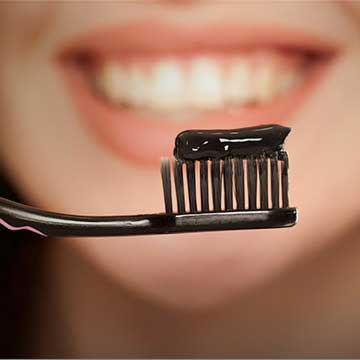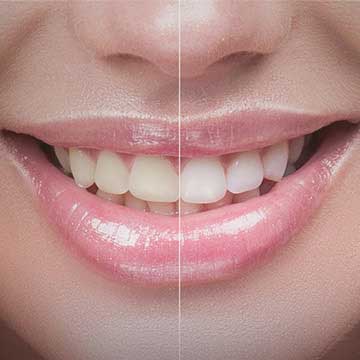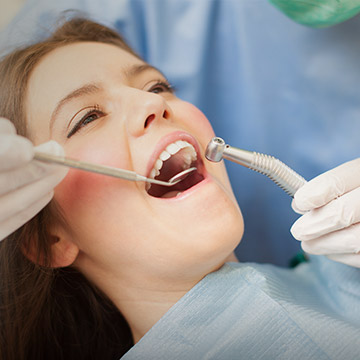Tooth sensitivity is never pleasant, and many individuals with sensitive teeth avoid daily activities like consuming hot or cold foods and beverages, eating tough or sticky foods, and brushing and flossing their teeth thoroughly.
Tooth sensitivity is more than just uncomfortable; it can lead to a variety of other dental problems and may indicate that something more serious is already developing. What causes sensitive teeth and how can you deal with them quickly, to get back to foods and beverages you love?
The Causes of Tooth Sensitivity
Tooth sensitivity occurs when the dentin, the porous tissue layer under your tooth enamel, becomes exposed. The dentin layer of your teeth contains microscopic channels, called tubules, which act as pathways to the nerve in the centre of your tooth. When the tubules are exposed, it allows the tooth’s nerve to become more easily triggered by certain stimuli, which caused tooth sensitivity.
There are a variety of things that can cause these tubules to become exposed:
- Worn Enamel or Exposed Tooth Roots: If your enamel becomes worn down, or your gums recede and expose the root of your tooth, it can expose the tubules and lead to tooth sensitivity. This can occur for a variety of reasons, including grinding your teeth. Even the pressure of grinding can cause tooth sensitivity in the absence of tooth wear.
- Gum Disease: Gum disease can cause your gums to pull away from your teeth, allowing hot, cold and sweet food or drinks better access to your tooth’s root.
- Cavities: Cavities are soft areas of enamel and dentine caused by acid which is produced by two types of bacteria that live in our mouths. If a cavity is not treated, it can become larger and deeper, causing temperature and sweet sensitivity. Once a cavity has reached the nerve it becomes infected causing a toothache that requires either root canal treatment or extraction.
- Worn or Defective Fillings: Cavities are repaired using fillings. However, if the filling itself becomes worn down or worn out, it is less effective at protecting your tooth’s sensitive inner layers.
- Improper Brushing Technique: We all know that it is essential to brush at least twice a day for two minutes and floss at least once per day, but many people don’t realize that there is a proper way to brush your teeth. If you brush too hard, you can wear away at the enamel on your tooth and damage your gums, causing them to recede. Worn enamel and receding gums can both lead to tooth sensitivity.
- Cracked Teeth: Teeth can sometimes develop cracks that may or may not be visible to the naked eye or on xrays. Your dentist can do bite and thermal tests to determine if this is causing your sensitivity.
Some individuals also experience tooth sensitivity after dental cleanings, dental treatments, or teeth whitening, but this type of tooth sensitivity is typically temporary and should go away on its own.
What You Can Do To Reduce Sensitivity
The first thing you should do if you are experiencing tooth sensitivity is visit your dentist. Your dentist will be able to determine what exactly is causing your tooth sensitivity and recommend appropriate treatments.
At Home Treatments
Depending on the severity of your tooth sensitivity your dentist may suggest some treatments that you can easily do on your own at home. These may include:
- Brushing more gently: Vigorous or hard scrubbing while brushing your teeth can damage both your teeth and your gums, causing tooth sensitivity, gum recession, and enamel wear. Select a soft-bristled toothbrush and brush your teeth using gentle strokes. You should also avoid highly abrasive toothpastes. Electric toothbrushes with pressure sensors that alert you to excessive brushing forces are helpful. If you need help selecting the right toothbrush and toothpaste for your needs you should ask your dentist or dental hygienist for recommendations.
- Using desensitizing toothpaste: Your dentist may suggest that you switch to a desensitizing toothpaste, which may help you block the pain associated with sensitive teeth. Your dentist or dental hygienist will be able to suggest a desensitizing toothpaste to suit your needs.
- Investing in a mouth guard: If your tooth sensitivity is caused by damage to you enamel caused by grinding your teeth your dentist may suggest that you wear a mouthguard while sleeping. While a mouthguard won’t prevent you from grinding your teeth, it will protect your enamel.
- Avoiding or limiting acidic foods and drinks: If your tooth sensitivity is triggered by acidic foods and beverages, you may want to consume them differently or avoid them altogether. Acidic foods and drinks include carbonated drinks, pop, sodas, lemon water, sports drinks like Gatorade, wine, beer, citrus fruits and juices and sour herbal teas. These can slowly eat away at your tooth enamel over time. Sipping these over a long period of time increases the acid exposure. If you consume acidic drinks, you should drink some water afterward to help neutralize any remaining acid in your mouth.
Dental Office Treatments
Some in-office treatments your dentist may suggest include:
- Fluoride: Depending on the cause of your tooth sensitivity your dentist may give you a fluoride treatment to strengthen your tooth enamel and reduce pain. They may also prescribe you fluoride to use at home, which you can apply using a custom tray. Rubbing a desensitizing toothpaste onto an area of root exposure several times a day can be very helpful.
- Desensitizing or bonding: Depending on your unique situation your dentist may be able to treat your sensitive teeth by applying a bonding resin to the sensitive surfaces to protect them.
- A surgical gum graft: If your tooth sensitivity is caused by gum recession your dentist may be able to take a small amount of gum tissue from the palate and use it to fortify the affected site. This can protect the roots of your teeth and reduce sensitivity.
- Root canal: If your sensitive teeth are causing your severe pain and other treatments appear to be ineffective your dentist may suggest you undergo a root canal. Root canals are used to treat problems in your dental pulp, the soft core of your tooth. It can be a highly effective way to eliminate tooth sensitivity permanently.
You don’t have to live with the pain of sensitive teeth. If you are experiencing tooth sensitivity, you should make an appointment with your dentist so that they can determine the root cause and suggest an appropriate treatment.









